|
Sea Wall
Dymchurch
01303 873979
https://whatpub.com/city-of-london

Above photo
showing not the pub but building to the left of it between 1893 and 1906. The
windmill just being seen in the distance extreme right. The landlady of
the "City of London" situated to the right of this photo had
the right to hang her washing out across the road. Bet they wouldn't
dare do that today. |

Above photo, circa 1905. |
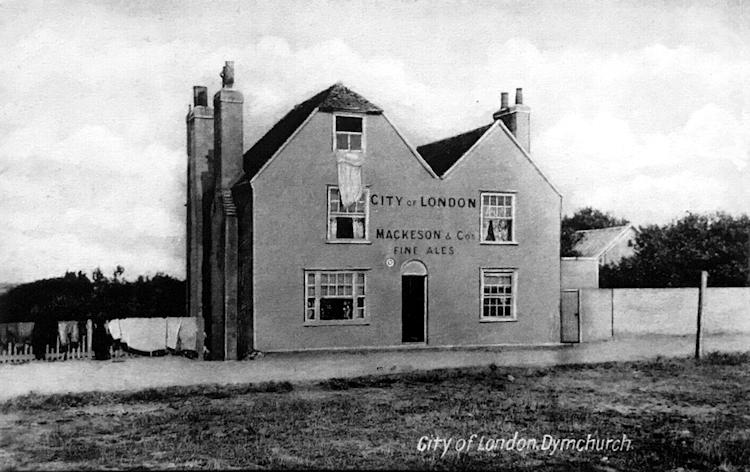
Above postcard, circa 1911, kindly sent by Rory Kehoe. |

Above postcard, date unknown. |

Above photo, date known, showing a charity penny drop event. |
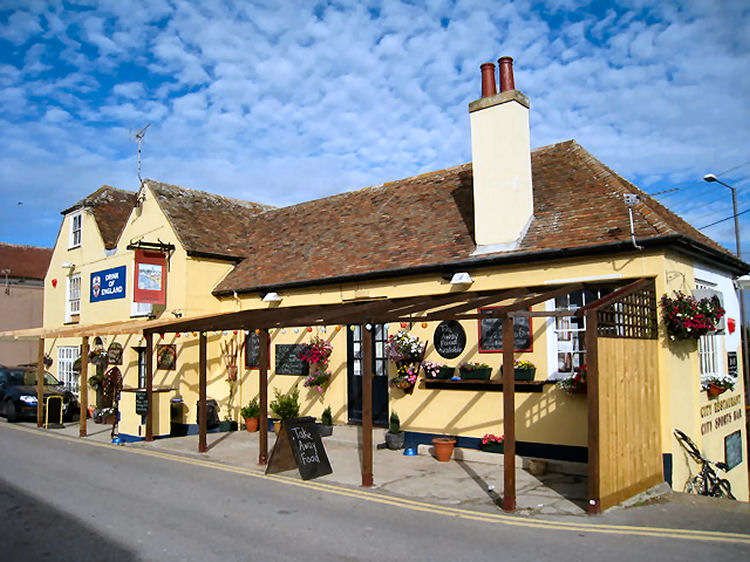
Above photo 2010 by Oast House Archives
Creative Commons Licence. |
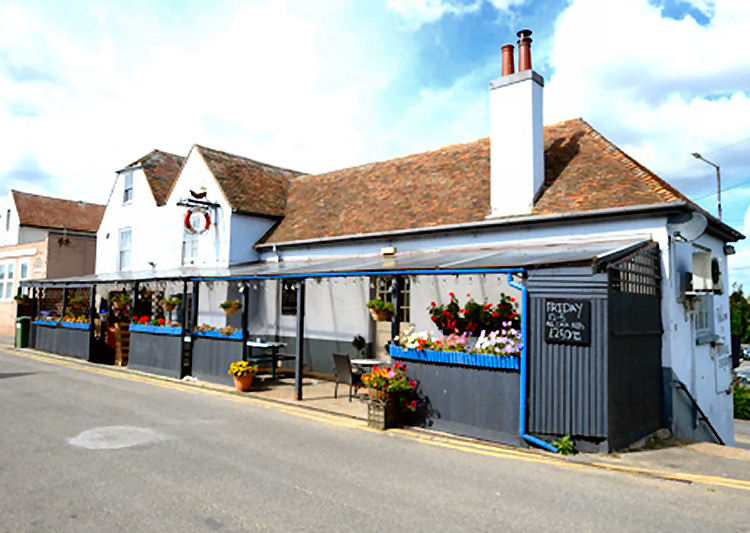
Above photo, 2019. |
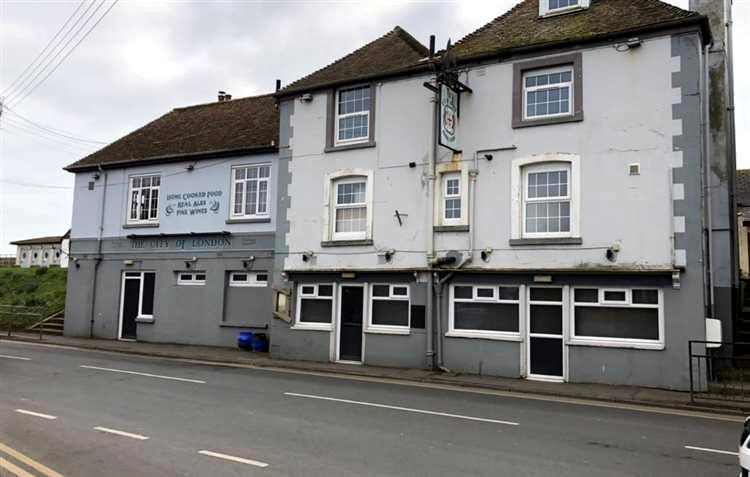
Above photo 2022. |

Above Google image, April 2025. |
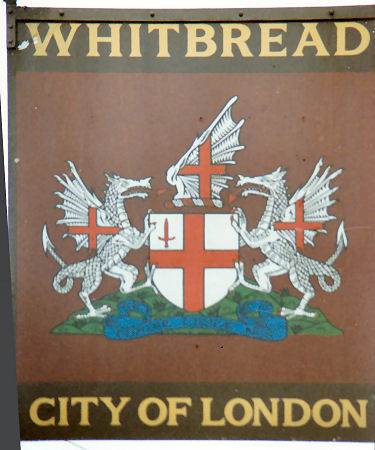 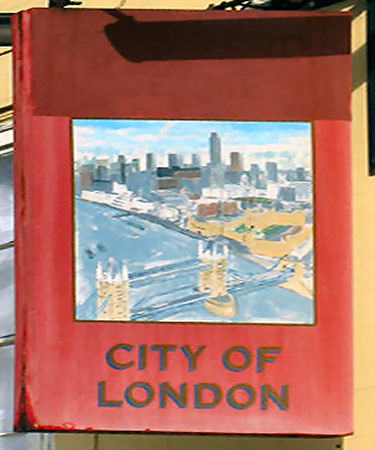
Above sign left March 1991, sign right 2010.
Above with thanks from Brian Curtis
www.innsignsociety.com. |
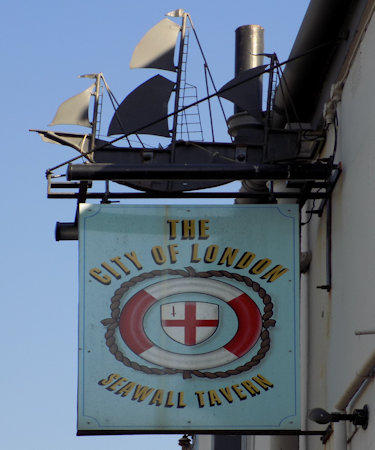 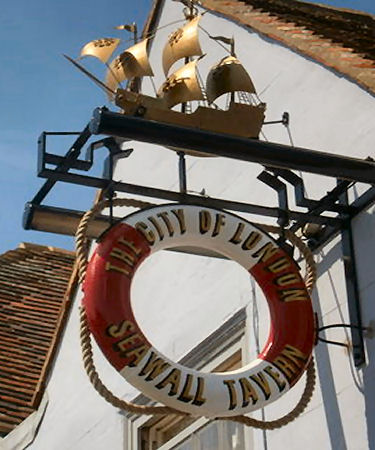
Above sign left 2015, sign right 2019.
With thanks from Roger Pester
www.innsignsociety.com. |
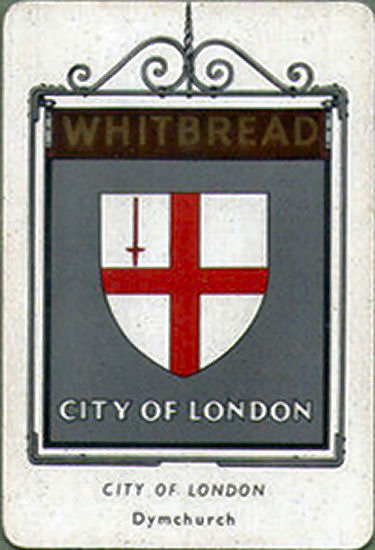
Above aluminium card issued June 1951. Sign series 3 number 11. |
The pub was within the original tied estate of Mackeson's Hythe Brewery,
prior to their 1929 amalgamation with Jude, Hanbury's Dane John Brewery,
Canterbury, which was, by then, under Whitbread ownership.
The sign in 1987 commemorates the local wreck of a barge of that name in
the eighteenth century, although it actually displayed the heraldic device,
which depicts the dagger associated with the death of Wat Tyler in 1381.
Originally called The "Seawall Tavern," this was a 16th Century inn.
During a storm in 1775, a ship called City of London was blown ashore and
collided with the inn, causing substantial damage. The ship's figurehead and
timbers were used to repair the building, and the name was changed to
reflect this.
The pub remains a memorial to those who died in the 1775 storm, and it is
well worth a visit both for its historical interest and for its food and
drink. The public house is mentioned in the Dr Syn novels.
|
From
http://www.dymchurch.org/history/inns.htm
CITY OF LONDON.
Located in the middle of the high street is the "City of London," which
was built in the sixteenth century as a coaching inn. The lower bars on
the high street are the stabling area of the original inn. It is the
establishment mentioned in the Dr Syn stories as the "Seawall Tavern."
There is a story of how the "Seawall Tavern" became the
"City of London."
Apparently during a great storm in the mid seventeen hundreds a ship
called the City of London was wrecked off the coast of Dymchurch, with a
great loss of life. So great was the storm and so gigantic the waves,
that the ship was tossed up over the sea wall and crashed into the
tavern, causing great damage to the building. The tavern was restored
using timbers from the wreck and as a commemoration for all the people
who were killed the tavern changed its name to the "City of London."
The figurehead of the ship stood for many years in Wraights Builders’
Yard and now stands in the New Hall. The signboard hanging outside the inn depicts the arms of the City of
London, which incorporate Wat Tyler’s dagger. Wat Tyler was a man of
Kent who in 1381 during the reign of Richard II, led an armed revolt
against a tax levied on the populus, a poll tax. They marched on
Canterbury and took Rochester Castle, then continued to march on to
London. In a meeting between the rebels and the Lord Mayor of London the
goodly Mayor stabbed Wat Tyler to death. |
|
From the Kentish Gazette, 28 March 1848.
Attempt at Self Destruction.
A person named John Thomas, employed in the letter delivery at Hythe
attempted to put a period to his
existence on Friday morning, at the "London Tap," by taking arsenic. Mr.
Podevin, surgeon, was promptly
called; by whom effective measures were retorted to, which resulted in
the partial recovery of the
unfortunate man, who was afterwards removed to Hythe, under the care of
a member of the police force.
From what transpired, we learn that the poisonous drug was procured from
a shop at Hythe, kept by
Thomas's father.
|
|
South Eastern Gazette, Tuesday 9 July 1861.
Romney Marsh.
At the petty sessions on Wednesday, before C. Rolfe, Esq., Bailiff,
and W. D. Walker, Esq, Benjamin Ransley, of
the "City of London" beer house, Dymchurch, appeared to a summons,
on the information of P.C. Boven, K.C.C.,
for keeping his house open for the sale of beer after 10 o'clock at
night of the 25th May last. The defendant
admitted the offence and was fined 5s. and 10s. costs.
|
|
Folkestone, Hythe, Sandgate & Cheriton Herald, Saturday 7 April 1928.
A WIFE'S APPLICATION.
Dymchurch Magistrates Refuse Separation Order.
At the Dymchurch Petty Sessions on Wednesday, Mrs. Eliza Philpott
applied for a separation order on the grounds of the wilful neglect of
her husband (Mr. Walter Philpott) and his failure to provide maintenance
for herself and the four children. The Magistrates were Messrs. W. B.
Smith (in the chair). H. J. Body, R. S. Jones, A. S. Jones, and Major F.
Krabbe.
Mr. S. Shea, of Margate, appeared for plaintiff, and Mr. J. E. Chappel
for defendant.
Mr. Shea and complainant had married on the 25th December, 1907, at
Dymchurch. At that time her husband was working for his father, the
former licensee of the "City of London Inn." There were four children of
the marriage. When the father died he was succeeded by his son. During
the past six or seven years, defendant had become intemperate. Latterly
he was more or less in a maudlin state of drunkenness, and used to go
into the bar and take money fro the till without keeping any record,
gave wrong change, and by passing his time with boon companions at other
licensed premises, spent the home money. In October last he had had a
serious illness, and it was only in January that he was able to get
about again. The takings had gone down to such an extent that it was
practically impossible to keep body and soul together. The average
takings per week were about £2. A piece of land belonging to the husband
had had to be sold. The husband had decided to relinquish his present
business.
Complainant gave evidence bearing out Mr. Shea's opening statement.
Cross-examined by Mr. Chapple, witness said she did not go near her
husband during the three months he was ill. She did not cook him his
food; her sister did. It was about four years since she had provided him
with any food.
Asked whether she desired maintenance for the children, complainant said
that she would rather her husband took charge of them. She wished to
live apart from him, and she would not go to him if he offered her a
home.
Interrogated as to why she did not cook him his food, witness said that
one day when she was busy preparing the meals for the visitors, her
husband had come in with a piece of pork and had asked her to cook it.
She had told him that she was too busy at the moment to do so, but had
not refused to cook it for him. He had gone out, and his sister had
cooked meals for him.
Walter William Philpott (19), the eldest son, gave the evidence.
Mr. Chapple contended that it was not a case of wilful neglect because
his client had had no money, and being ill, had not been able to get
work.
Defendant said that he had been licensee of the premises for 20 years 3
months. Before that his father had been the licensee for 22 years. He
denied ever having taken the money from the till, but even if he had, it
would have been his own money. Nor had he been under the influence of
drink.
Cross-examined by Mr. Shea, witness admitted having made promissory
notes under his wife's name. he had got a home to go to when he have up
the brewery business, and his wife was free to come if she liked. Trade
had gone down owing to the place not having been kept clean. He had
never struck his wife, but had called her a ______.
Mr. Alfred James Beattie, a collector in the employ of Messrs.
Mackeson's, Hythe, said that the "City of London" was one of his firm's
houses. There had always been a good living there. He had known Philpott
for the last thirteen years, and he had always been satisfactory.
After retiring a short while, the bench dismissed the case, each party
being ordered to pay his or her own costs.
The transfer of the license from Mr. Walter Philpott to Mr. Edwin John
Price, formerly a chauffeur in the employ of Lord Warrington, was
granted.
|
|
Folkestone, Hythe, Sandgate & Cheriton Herald 01 November 1930.
TANK CORPS MAN KILLED. HYTHE EMPLOYEE GRAVELY INJURED.
One man was burned to death, and two others were injured, one seriously,
when two motor-cycles collided head-on and burst into flames on the road
between Hythe and Dymchurch on Thursday evening. The man who was fatally
burned was Private Richard Niblett of the Royal Tank Corps, stationed at
Lydd. The rider of the other machine, Mr. Alfred Nicholson, an employee
of the Hythe Gas and Light Company, and who has lived for the past year
at the "City of London Inn," Dymchurch, to which he was proceeding from
work at the time, was seriously burned, and was taken to the Royal
Victoria Hospital, Folkestone, in a critical condition.
Private George Rodd, also of the Tank Corps, who was riding pillion on
Niblett's machine, received a fractured wrist, and was removed with
Nicholson to hospital.
|
|
Folkestone, Hythe, Sandgate & Cheriton Herald, Saturday 8 June 1940.
Death.
Price. On June 4th, at the "City of London," Dymchurch, Kent, Daisy
Merton, the beloved wife of Edwin James
Price.
|
The pub appears to have reverted back to the "City of London" again, and
unfortunately closed around January 2023. However, I have just been
contacted by the new owners who say the pub will open again soon.
LICENSEE LIST
RANSLEY Benjamin 1861+
PHILPOTT William 1886-Jan/1908 (age 39 in 1891 ) )
PHILPOTT Walter Jan/1908-Apr/28 (age 32 in 1911 ) )
PRICE Edwin John Apr/1928-41+ (age 59 in 1939)
 Census Census
|













